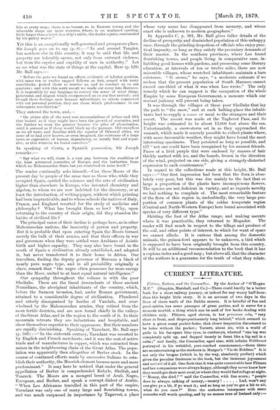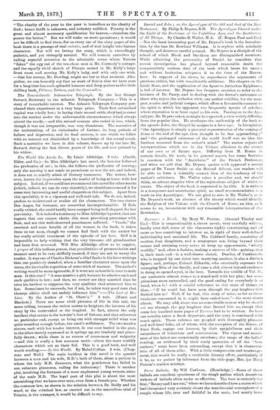CURRENTLITERATURE.
Flitters, Tatters, and the Counsellor. By the Author of " O'Hogan M.P." (Simpkin, Marshall, and Co.)—There could hardly be a better book for a short railway journey, or indeed for any weary half-hourr than this bright little story. It is an account of two days in the lives of three waifs of the Dublin streets. It is brimful of fun and good-spirits, has some passages of great pathos, and is never for a moment morbid, a thing which can be said of few books dealing with children only. Flitters, aged eleven, in her princesse robe, "very short in front, and disproportionately long behind," which seemed to have a great many pocket-holes, that closer inspection discovered to be holes without the pocket ; Tatters, about six, with a world of guile in his far-apart blue eyes, in corduroys, whereof "one leg was completely split up, and flapped loosely in front like a big sail in a calm ;" and finally, the Counsellor, aged nine, with infinite Weltlaunst portrayed in his wrinkled, poet-marked countenance,—these three are as entertaining as the students in 3:larger's "Vie de Boheme." It is not only the brogue (which is, by the way, absolutely perfect) which gives the peculiar freshness to the book, but the immense joyousness and naisetd of it all. One feels that it was quite conceivable how Flitters and her companions were always happy, although they never knew how they would get their next meal, or where they would find refuge at night. " ' Money, the divll !' " said the Counsellor, with fine scorn; "people
does be always talking of money,—money Lad, won't any one give ye a bit, if ye want it; and so long as you've got a bit to ait,. what do you care ?" Here the authoress interposes with some remarks well worth quoting, and by no means true of Ireland only'-
" The charity of the poor to the poor is boundless as the charity of God ; hence thrift is unknown, and industry nullified. Poverty is the great and almost necessary qualification for heaven,—therefore the poorer the better." But we will make no more quotations; it would not be difficult to find them, for on every one of the sixty pages of the book there is a passage of real entrain, and of real insight into human character. Nor will we betray the story, which is exceedingly pathetic, and yet strangely natural. We will content ourselves by calling especial attention to the admirable scene where Tatters 'fakes" the egg out of the tea-chest nest in Mr. Carmody's cottage, and the equally vivid sketch of Flittgrs seated in Mr. Kelly's large front room and nursing Mr. Kelly's baby, and with only one wish, —that her enemy, Mr. Dowling, might see her at that moment. Alto- gether, we can honestly say that no work of fiction that we have seen for a long time has such splendid humour and deep pathos as this little shilling book,.Flitters, Tatters, and the Counsellor.



































 Previous page
Previous page